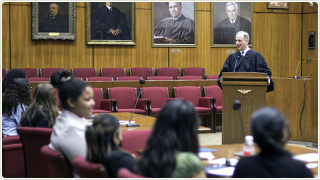
Court Camps: Changing Lives, Transforming Futures
Thursday, March 7, 2024

 When Second Circuit Court of Appeals Judge Joseph F. Bianco talks about bringing young people into federal courts for summer camps, he often refers to the experience of exposing students to the Judiciary as “planting seeds.”
When Second Circuit Court of Appeals Judge Joseph F. Bianco talks about bringing young people into federal courts for summer camps, he often refers to the experience of exposing students to the Judiciary as “planting seeds.”
Interestingly, the summer court camp program that he founded in 2016 at the courthouse on Long Island was the seed of a program that has spread to three locations in New York and one courthouse in Connecticut. The concept has taken root in other parts of the country as well.
“The court system has a responsibility,” Bianco said. “It can play a big role in civics education. If students meet people who are part of the court system, then we are really serving the public in a special way.”
During a recent interview with the Berkeley Judicial Institute (BJI), Bianco discussed the fertile ground for the program cultivated by the late Second Circuit Chief Judge Robert A. Katzmann and his Justice for All: Courts and the Community initiative. The interview is part of a series featuring federal judges who are active in civics education and outreach in their communities.
“Bringing students into the courts makes the system more accessible and understandable to young people,” Bianco said. “Extended exposure to the law and legal professionals has the potential to change their lives and their futures.”
The initial Justice for All project was a series of class field trips to the Thurgood Marshall U.S. Courthouse in Manhattan that included courtroom observations and interactions with judges and lawyers. Bianco saw the benefits and wanted to increase the impact of these efforts by reaching underserved students and giving them a free summer camp and other opportunities in the law that might not otherwise be available to them.
That motivation brought the Justice Institute into existence in the federal courthouse on Long Island and the program is now active in Brooklyn, Manhattan, Long Island, and Hartford, Connecticut.
Many students expressed a newfound interest in legal careers after attending the camp. Students also said, they were surprised by the humanity, humor, and personalities of the participating judges and lawyers.
One student wrote this about the experience: I’m very thankful for this program. Law has always been a field I was interested in but was largely inaccessible to me. My parents aren’t lawyers; no one in my family has ever studied law. I’ve always thought that law was something that you can only study or do if you have money, and that is not terribly untrue, but this program has allowed me to meet incredible people — experienced judges, lawyers, marshals. I really enjoyed this program and am grateful for this opportunity.
A memorable part of the summer camp program is inviting parents to watch the culminating event: a mock trial in a courtroom. After one such event, Bianco was particularly moved by a mother who approached him with tears in her eyes after watching her daughter argue as a student lawyer in the grandeur of a federal courtroom. She told him: “We could never afford a camp.”
When it comes to “planting seeds,” Bianco said, “Sometimes you see it right away in the students during the mock trials. Sometimes it might take years to come to fruition.
“It is not uncommon for participants to develop lasting connections with the courts as a result of their experiences,” said Bianco. “In fact, some students have gone on to become college interns at the courthouse.”
In the BJI video, Bianco shared guidance for starting court-based experiential learning for students:
- Don’t be hesitant to start a program. It might sound daunting, but people always say “yes.” They want to get involved and they find it personally rewarding.
- When you do the program once, you can replicate it.
- When it comes to the administrative aspects, involve the law librarians and court staff.
- Each court can modify the program and scale it to their own capacities.
- Across the educational and legal communities — bar associations, law firms, law schools, and civics education organizations will step up. You’re not on your own.
- Schools want to participate. They understand that they need help with civics. Contact teachers and the schools’ social studies networks directly, rather than superintendents and administrators.
- Proactively reach out to schools and underserved communities.
- Ask high-profile guests to participate. They will give their time.
- High school students don’t want long lectures, so keep the program fast paced and active.
- Another way to maintain student engagement is through special guests and speakers. In New York, the headliners have included Mary Beth Tinker, as well as a woman who participated in the Montgomery bus boycott and another who survived a Japanese internment camp.
